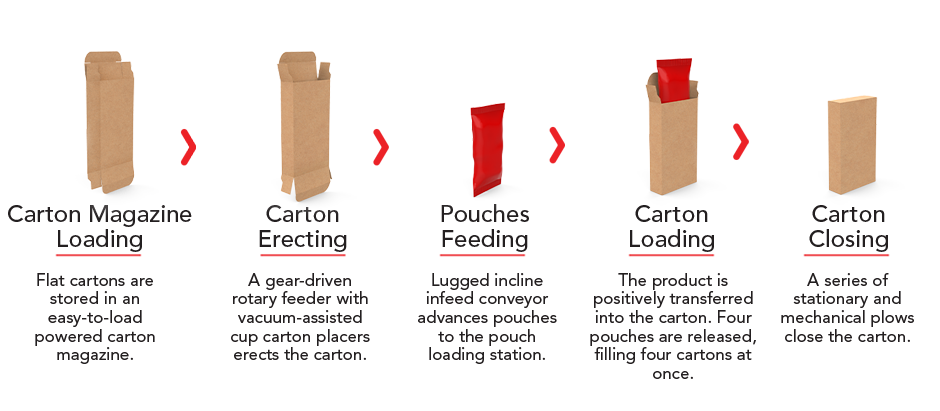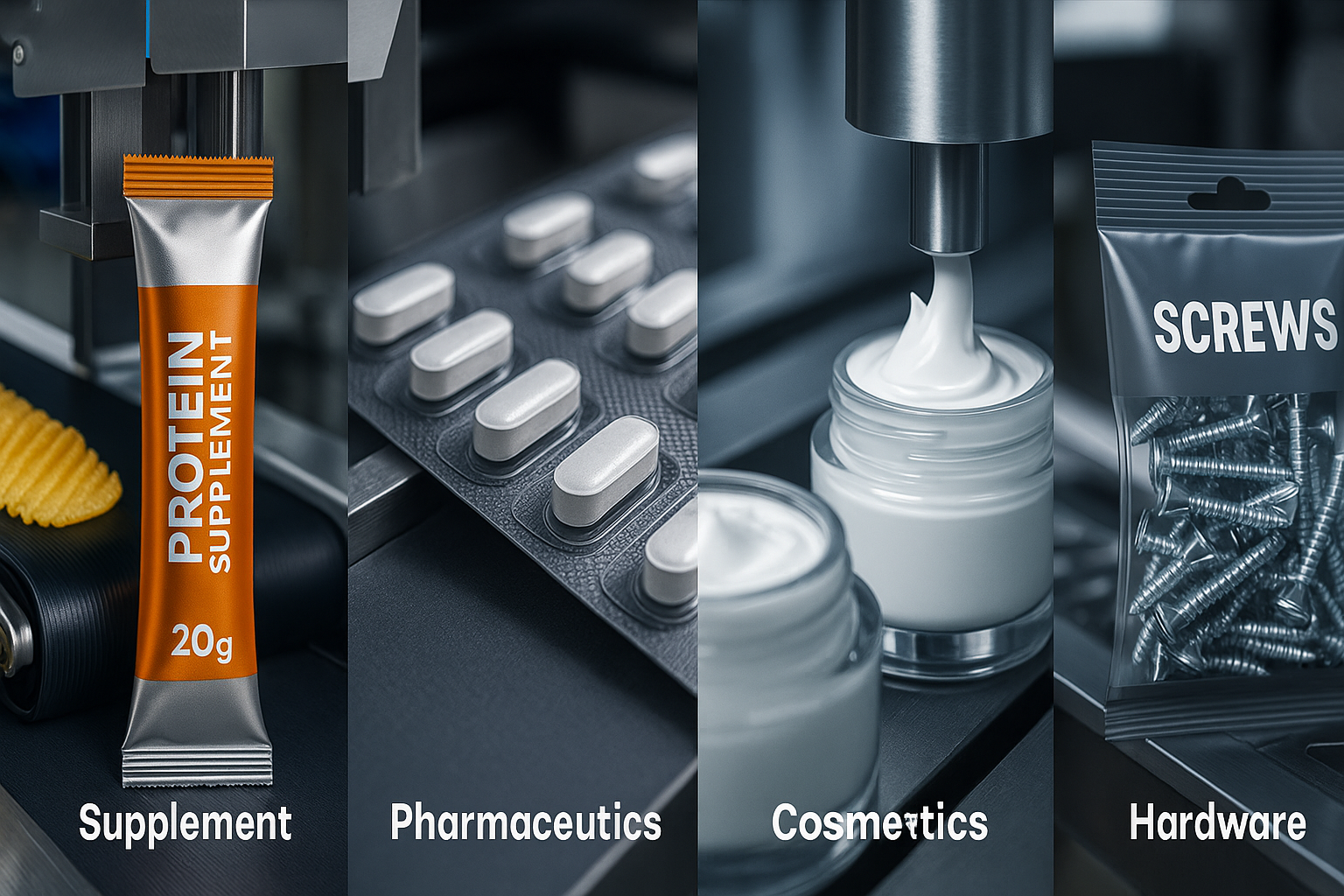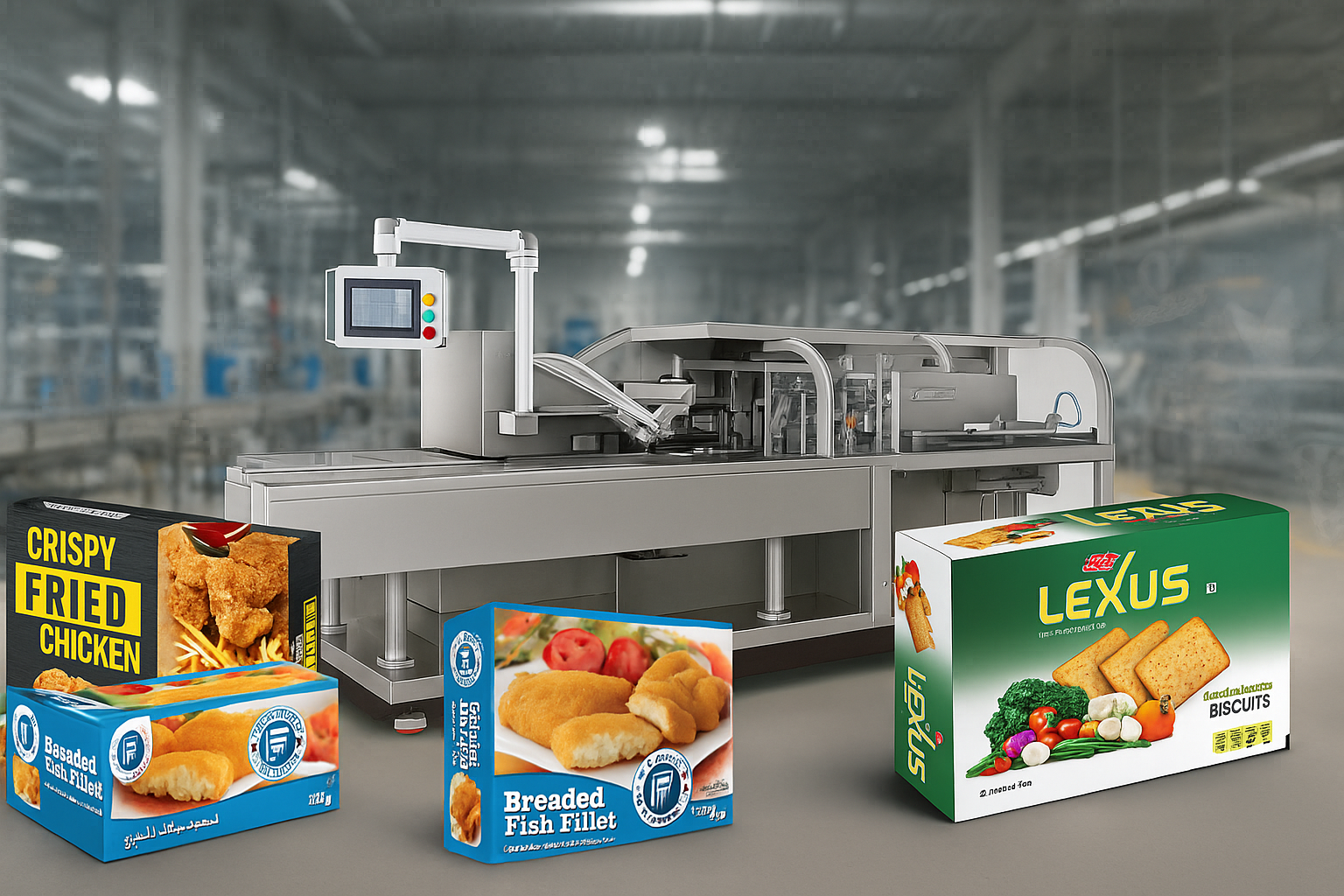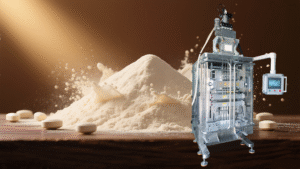In the global food and pharmaceutical industries, efficiency, consistency, and compliance are the three pillars of sustainable packaging. Among the many technologies driving progress, the food cartoning machine has emerged as a cornerstone solution for automating packaging lines. Whether you are a snack manufacturer, a supplement producer, or a frozen food processor, cartoning technology plays a crucial role in ensuring that your products are packaged securely, attractively, and in compliance with global standards.
At BURGEN, we specialize in designing cartoning machines that address the evolving needs of international manufacturers. This guide is designed to help you understand what a food cartoning machine is, why it matters, which type best fits your requirements, and how integration across your production line can maximize ROI

What is a Food Cartoning Machine?
A food cartoning machine is an automated system designed to form cartons, insert products, and seal them for distribution. Unlike manual processes, which are prone to errors and inefficiencies, automatic cartoning machines provide a reliable, high-speed solution that meets the growing demands of the food, pharmaceutical, and cosmetic industries.
Modern cartoners are available in different configurations, including horizontal cartoning machines, vertical cartoning machines, automatic top-load cartoners, and end-load cartoners. Each type addresses specific product characteristics and packaging requirements.
👉 Explore more options on our Cartoning Machines category page.
Why Food Manufacturers Rely on Cartoning Machines
Food manufacturers around the world face mounting challenges: growing consumer demand, rising labor costs, and strict regulatory requirements. Relying on manual packaging is no longer sustainable. That is why automatic food cartoning machines have become indispensable.
Unmatched Speed and Consistency: A high speed cartoning machine can consistently handle 120–300 cartons per minute, which equates to thousands of units per hour. This ensures that production keeps pace with market demand while maintaining uniform packaging quality.
Gentle Handling for Delicate Products: Many food items—such as chocolate bars, snack pouches, or frozen ready meals—require careful handling to avoid breakage. Modern cartoners use robotic pick-and-place units, vacuum-assisted loading, and servo-controlled movements to guarantee gentle yet precise product placement.
Regulatory Compliance: With stricter food safety standards worldwide, consistency is critical. Cartoning machines provide tamper-evident sealing, batch coding, and barcode labeling, helping manufacturers meet FDA food labeling standards and EFSA food safety regulations.
Cost Efficiency: By reducing reliance on manual labor, cartoning machines significantly cut operational costs while also reducing human error, which can lead to product recalls.
For manufacturers producing multiple SKUs, horizontal cartoning machines allow fast product loading and format changes, making them highly versatile in competitive food markets
Which Type of Cartoning Machine Fits Your Needs?
Choosing the right cartoner depends on the nature of your products, production volume, and integration needs. Below are the most common categories:
Horizontal Cartoning Machine – Ideal for stable, uniform products like sachets, pouches, or stick packs.
Vertical Cartoning Machine – Suited for loose, irregular products such as candies, small hardware, or capsules.
Top-Load Cartoner – Perfect for fragile or oddly shaped products requiring robotic placement.
End-Load Cartoner – Best for streamlined, uniform products that can be pushed directly into cartons.
Continuous Motion Cartoner – Designed for ultra-high speed operations.
Intermittent Motion Cartoner – Offers flexibility for smaller batches and frequent changeovers.
👉 Learn more about specialized models such as our Sachet Cartoning Machine.
How Cartoning Machines Integrate with Your Packaging Line
A food cartoning machine is rarely a standalone investment—it is designed to integrate seamlessly within a larger packaging line. Typically, cartoners are positioned downstream of stick pack machines, sachet packing machines, or flow wrappers. This allows for direct product transfer, reducing manual handling and contamination risk.
Integration delivers measurable advantages:
Upstream Synchronization: Cartoning machines can be linked directly to counting , sachet, or stick pack machines, ensuring a continuous flow of products without bottlenecks.
Downstream Connectivity: Once cartons are formed and sealed, they can move directly to case packers, shrink-wrapping systems, or palletizing robots, completing a fully automated end-of-line process.
Smart Line Control: Advanced cartoners now feature Industry 4.0-ready interfaces, enabling real-time monitoring, predictive maintenance, and data-driven efficiency improvements. The World Packaging Organisation (WPO) reports that integrated lines can increase total throughput by up to 30%.
Versatility Across Industries: In cosmetics or pharmaceuticals, integration ensures fragile vials, cream tubes, or sample sachets are boxed accurately before reaching logistics.
This seamless integration makes cartoning machines not just a piece of equipment but a central hub in automated packaging systems.
Industry Applications of Food Cartoning Machines

Food Industry
Snacks & Confectionery: Chocolate bars, biscuits, and candy packs.
Frozen Food: Ready meals, frozen vegetables, and meal kits.
Bakery: Cookies, muffins, and pastries.
(See more insights from Food Processing Magazine)
Pharmaceuticals
Blister Packs: Tablets and capsules.
Vials & Ampoules: Glass packaging that requires gentle handling.
Nutritional Supplements: Gummies, powders, and sachets.
Cosmetics & Personal Care
Cream Tubes: Skincare and ointments.
Perfume Bottles: Fragile glass bottles requiring secure boxing.
Sample Sachets: Promotional cosmetics and personal care items.
Why Automation Delivers ROI
When manufacturers consider investing in an automatic cartoning machine, the discussion quickly turns to return on investment (ROI). Automation in cartoning delivers ROI through multiple channels:
Labor Savings
A single high speed cartoning machine can replace multiple manual operators, lowering labor costs significantly. This is especially important in markets with rising wages or labor shortages.Reduced Waste and Rework
By ensuring precise carton forming and sealing, modern cartoners minimize wasted packaging materials. Fewer errors mean fewer product recalls, which directly protects brand reputation.Faster Changeovers
With servo-driven technology and automated adjustments, manufacturers can switch from one SKU to another in minutes. This flexibility is critical in industries where short production runs and product variety dominate.Higher Throughput and Reliability
According to PMMI, packaging automation can increase line productivity by up to 25% while reducing downtime. Over a single fiscal year, this efficiency translates into millions in additional revenue.Compliance and Market Access
Automated cartoning machines ensure consistent quality, tamper-proof seals, and traceability features required for entering regulated markets. Without this, manufacturers risk being excluded from lucrative markets such as the EU or North America.
Ultimately, ROI is not just about cost savings—it’s about enabling sustainable growth. By investing in automation, companies can scale production, reduce operational risks, and gain a stronger competitive edge in global markets.
How to Choose the Right Supplier
When evaluating cartoning machine suppliers, look for:
Customization Capabilities – The ability to tailor solutions for your specific product type.
After-Sales Support – Reliable technical assistance and spare parts availability.
Integration Expertise – Experience in connecting cartoning machines with upstream and downstream systems.
Proven Industry Track Record – Case studies and client testimonials from food, pharmaceutical, or cosmetic brands.
👉 Ready to explore your options? Contact BURGEN to speak with our experts today
Conclusion
The food cartoning machine is more than just a piece of equipment; it is a critical enabler of growth in food, pharmaceutical, and cosmetic packaging. By understanding what it is, why it matters, which type fits your business, and how integration maximizes ROI, you are better positioned to make informed investment decisions.
At BURGEN, we are committed to delivering high-speed, gentle-handling, and fully integrated cartoning solutions that keep our clients competitive in global markets.
👉 Visit BURGEN to learn more or contact us directly to begin designing a packaging solution tailored to your production line




2 Comments
Your mode of describing all in this post is really good, all can without difficulty be aware of it,
Thanks a lot.
Thank you for your recognition.